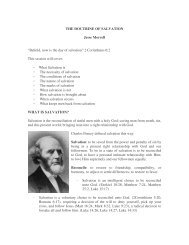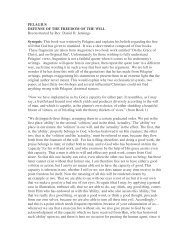Does_God_Take_Away_Free_Will_Jesse_Morrell 2.pdf - PinPoint ...
Does_God_Take_Away_Free_Will_Jesse_Morrell 2.pdf - PinPoint ...
Does_God_Take_Away_Free_Will_Jesse_Morrell 2.pdf - PinPoint ...
You also want an ePaper? Increase the reach of your titles
YUMPU automatically turns print PDFs into web optimized ePapers that Google loves.
<strong>God</strong> loves judgment (Isa. 61:8) and is displeased and<br />
grieved when there is no judgment (Isa. 59:15) because just<br />
government (laws and punishments) are designed to promote the<br />
well-being of the creation that He loves (Rom. 13:4). The righteous<br />
also rejoice in judgment (Ps. 58:10; Rev. 6:10; 18:20; 19:1-3).<br />
Laws and punishments are designed to promote public justice. The<br />
very purpose of retributive justice is to promote public justice. The<br />
law of <strong>God</strong> is good and the punishments prescribed to enforce<br />
them are good. So <strong>God</strong> does not kill or execute for personal<br />
pleasure as some selfish, sadistic, sick tyrant. <strong>God</strong> executes wrath<br />
upon the wicked because He’s a benevolent ruler, who is set on<br />
upholding and enforcing His laws which are designed to promote<br />
the well-being of the creation He deeply loves. Wrath must be<br />
understood as governmental, rooted in benevolence, as opposed to<br />
personal, rooted in malevolence or maliciousness. The reason for<br />
His wrath is governmental, not personal, it necessary to maintain<br />
good government.<br />
THE NATURE OF FORGIVENESS<br />
The Bible uses words such as “forgiveness” “pardon” and<br />
“remission”. Forgiveness, pardon, and remission are used in both<br />
the Old and the New Testament to describe <strong>God</strong> letting our sins go<br />
as if they had not been committed, letting our sins go unpunished,<br />
passing over them as if they never existed (Ex. 20:7; 34:7; 34:9;<br />
Lev. 4:20, 26; 19:22; Nu. 14:18; 14:19-20; 15:25-26; 30:5, 8, 12; I<br />
Kin. 2:9; 8:30, 34, 36, 39, 50; II Chr. 6:21-39; 7:14; Neh. 1:3; 9:17;<br />
Ps. 19:12-13; 25:11; 103:3; 130:4; Is. 55:7; Jer. 30:11; 31:34; 33:8;<br />
36:3; 46:28; Joel 4:21; Dan. 9:9-10; 9:19; Amos. 7:2; Mt. 6:12, 14,<br />
15; 9:2, 5, 6; Mk. 2:5-10; Lk. 5:20-24; 12:31-32 (Mk. 3:28-30);<br />
18:21, 27, 32, 35; Mk. 4:12; 11:25-26; Lk. 7:47-49; 11:4; 12:10;<br />
17:3-4; 23:34; Jn. 20:23; Acts 8:22; Rom. 4:7; Jas. 5:15; I Jn. 1:9;<br />
2:12).<br />
The word “aphesis”, for example, is translated as<br />
“remission” (Matt. 26:28; Mk. 1:4; Lk. 1:77; 3:3; 24:47; Acts 2:38;<br />
10:43; Heb. 9:22; 10:18) and as “forgiveness” (Mk. 3:29; Acts<br />
5:31; 13:38; 26:18; Eph. 1:7; Col. 1:14). “Aphesis”, means pardon,<br />
letting sins go as if they had never been committed; passing over<br />
sins or passing them by as if they didn’t exist or as if they never<br />
occurred; remitting the penalty that is justly deserved. Forgiveness<br />
of sins is when the punishment of sin is set aside, when <strong>God</strong> allows<br />
the sins themselves to go unpunished, letting them go as if they<br />
were not committed. Forgiveness is when a claim is relaxed or a<br />
penalty is dispensed with (1 Chro. 21:7-15; 2 Chro. 12:5-7, 32:26;<br />
2 Sam. 24:16; 24:25; Num. 16:46-48; Ps. 78:38; 106:23, 45; Jer.<br />
18:8; Eze. 20:17; Micah 7:18-19; Jonah 3:9-10; 4:2; Joel 2:13-14).<br />
Forgiveness is when <strong>God</strong> turns from His wrath or anger (Deut.<br />
13:17; Num. 25:4; Josh. 7:26; Ps. 78:38; 85:3-4; Joel 2:13; Jonah<br />
3:9; Isa. 12:1; Jer. 3:12; Dan. 9:16; Hos. 11:9; 14:4). Forgiveness<br />
of sins is when <strong>God</strong> does not punish sins (Acts 5:31; 13:38; 26:18;<br />
Eph 1:7; Col 1:14; Heb 9:22), the pardon of a debt is when the<br />
payment for a debt is remanded instead of demanded (Matt 6:12;<br />
18:27; Lk. 7:42). Pardoning sins, passing over transgression,<br />
delighting in mercy, is one of <strong>God</strong>’s glorious attributes (Micah<br />
7:18). Punishment and forgiveness cannot co-exist, they are<br />
opposites (but atonement and forgiveness can co-exist). The<br />
pardon of a debt and the payment of a debt are polar opposites<br />
(Matt. 18:23-35). Mercy is the opposite of judgment (Heb. 10:27-


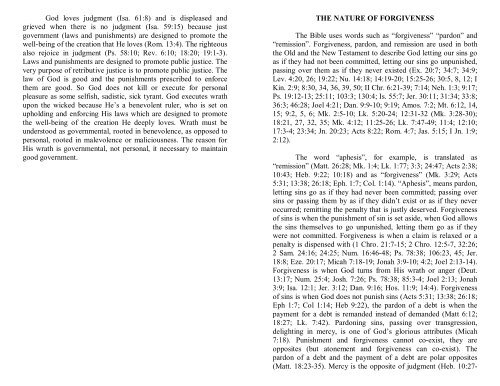

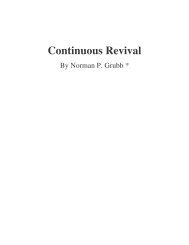
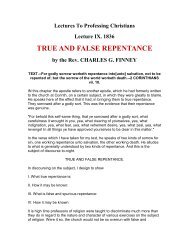
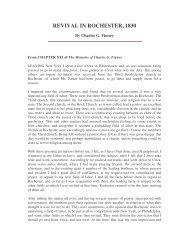

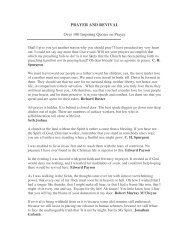
![[PDF] SIX DAYS OR MILLIONS OF YEARS? - Answers in Genesis](https://img.yumpu.com/34887318/1/190x245/pdf-six-days-or-millions-of-years-answers-in-genesis.jpg?quality=85)




